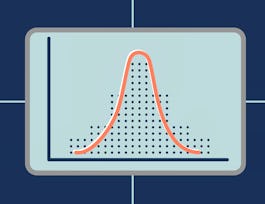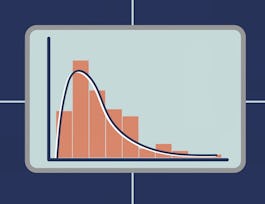Bayesian Statistics: Mixture Models introduces you to an important class of statistical models. The course is organized in five modules, each of which contains lecture videos, short quizzes, background reading, discussion prompts, and one or more peer-reviewed assignments. Statistics is best learned by doing it, not just watching a video, so the course is structured to help you learn through application.


Bayesian Statistics: Mixture Models
This course is part of Bayesian Statistics Specialization
Taught in English
Some content may not be translated

Instructor: Abel Rodriguez
8,468 already enrolled
Included with 
Course
(48 reviews)
Recommended experience
What you'll learn
Explain the basic principles behind the algorithm for fitting a mixture model.
Compute the expectation and variance of a mixture distribution.
Use mixture models to solve classification and clustering problems, and to provide density estimates.
Skills you'll gain
Details to know

Add to your LinkedIn profile
11 quizzes
Course
(48 reviews)
Recommended experience
See how employees at top companies are mastering in-demand skills

Build your subject-matter expertise
- Learn new concepts from industry experts
- Gain a foundational understanding of a subject or tool
- Develop job-relevant skills with hands-on projects
- Earn a shareable career certificate


Earn a career certificate
Add this credential to your LinkedIn profile, resume, or CV
Share it on social media and in your performance review

There are 5 modules in this course
This module defines mixture models, discusses its properties, and develops the likelihood function for a random sample from a mixture model that will be the basis for statistical learning.
What's included
9 videos7 readings7 quizzes2 peer reviews1 discussion prompt
What's included
4 videos2 readings2 peer reviews1 discussion prompt
What's included
6 videos2 readings2 peer reviews
What's included
7 videos3 readings3 peer reviews
What's included
7 videos5 readings4 quizzes1 peer review1 discussion prompt
Instructor

Offered by
Recommended if you're interested in Data Analysis

University of California, Santa Cruz

University of California, Santa Cruz

University of California, Santa Cruz
Why people choose Coursera for their career




Learner reviews
Showing 3 of 48
48 reviews
- 5 stars
68.75%
- 4 stars
18.75%
- 3 stars
12.50%
- 2 stars
0%
- 1 star
0%
New to Data Analysis? Start here.

Open new doors with Coursera Plus
Unlimited access to 7,000+ world-class courses, hands-on projects, and job-ready certificate programs - all included in your subscription
Advance your career with an online degree
Earn a degree from world-class universities - 100% online
Join over 3,400 global companies that choose Coursera for Business
Upskill your employees to excel in the digital economy
Frequently asked questions
Access to lectures and assignments depends on your type of enrollment. If you take a course in audit mode, you will be able to see most course materials for free. To access graded assignments and to earn a Certificate, you will need to purchase the Certificate experience, during or after your audit. If you don't see the audit option:
The course may not offer an audit option. You can try a Free Trial instead, or apply for Financial Aid.
The course may offer 'Full Course, No Certificate' instead. This option lets you see all course materials, submit required assessments, and get a final grade. This also means that you will not be able to purchase a Certificate experience.
When you enroll in the course, you get access to all of the courses in the Specialization, and you earn a certificate when you complete the work. Your electronic Certificate will be added to your Accomplishments page - from there, you can print your Certificate or add it to your LinkedIn profile. If you only want to read and view the course content, you can audit the course for free.
If you subscribed, you get a 7-day free trial during which you can cancel at no penalty. After that, we don’t give refunds, but you can cancel your subscription at any time. See our full refund policy.


